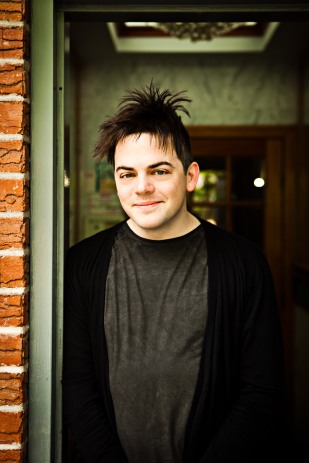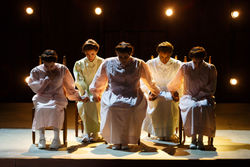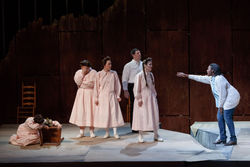Nico Muhly, Dark Sisters, and the Case for New Opera (part I of a series)
by Andrew Swensen
I sit down with Nico Muhly, and my first question has been set for a week. Opera has been on my mind for some time, and specifically the prospect of creating new works in an art form dominated by its past and not its present. Muhly is one of the few composers creating opera, and hearing his perspective is a special privilege. So I put the question to him: “How would you define opera, and in our day what does it take for a work to still be called an opera?”
He replies, “When you start thinking ‘What’s an opera? What’s musical theater?’ I realize that’s 20 minutes I could have used to learn Icelandic or something actually useful that makes the world a better place.”
This may just be the finest answer I have ever had.

Nico Muhly (Photo: Matthew Murphy, courtesy of www.nicomuhly.com)
There are those of us who want to noodle on what defines art, and what defines specific forms more narrowly. Oh yes, we revel in tracing influences and noting innovations. There are reasons for these contemplations, reasons to separate literature from painting, music from architecture. Reasons too for tracing history.
Then there are those who remind us that sometimes artists just make art. Thank you, Nico Muhly.
At times we treat certain art forms as a closed set. Complete. We want our reliable standards and nothing more, nothing new. Opera has this challenge. Treating the creative period of opera as if it were behind us, we put it into a museum for preservation. We have Puccini, Verdi, Wagner…and that’s it. This line of thinking does not engage opera as an open, productive field in the same way that we do film, contemporary music, and even opera’s descendant: the musical. In those cases we reward the new, and celebrate the innovators at the leading edge. However, in other art forms, we forget that there might be things left to write.
It is a wonderful thing to preserve the great works of the past. The arts should still have performances of Shakespeare, Renaissance music, nineteenth-century ballet, and yes, Mozart’s operas. Yet why should we cap any art form at a particular time?
I want to argue for a change in that thinking, and Nico Muhly is my case study.
Muhly is a superior musician with a profound appreciation for its past. He talks with ease about Tallis and Byrd, and the court politics of being a Catholic composer in Protestant England of the sixteenth century. On the other hand, he is also an active composer. Speaking on opera, he says, “Fussing over what it is and what it isn’t doesn’t seem a productive use of a composer’s time. My head would explode if I started worrying about it.” The statement is liberating. While having an impressive command of music history, Muhly clearly has not allowed history to limit him, nor has he allowed history to become a closed set.
“I do not think that it is necessarily a bad thing that opera is ‘museum-ized’,” Muhly says when I ask about our confined view of opera to what it has been. “You have museums, and you have galleries.” Both exhibit work, one the old and the other the new. He is right on so many levels, and his metaphor holds true in the case of opera and the other performing arts. This situation puts a burden both on our arts organizations, and on our audiences. In the case of some arts, organizations need to be on both sides of the equation, the historical conservator and the programmer, even commissioner, of new work. Some cities may be big enough, or some art forms broadly supported enough, where you can have organizations that specialize in one or the other. However, for some of the arts, it is difficult to have multiple, full-time production companies.
So organizations need to seek out a balance. The Pittsburgh Opera has thankfully done just so, and because of their effort, I have the good occasion to sit down with Muhly and also to see his opera Dark Sisters.
Muhly’s creative output spans a wide range of genres, and as Tristan Kraft wrote in an October 2013 article for Opera News, it is impossible to “pigeonhole” Muhly. He moves freely and enthusiastically between sacred music, opera, songwriting, film scores, and collaborations with the likes of Philip Glass, Sigur Ros and Bjork. Dark Sisters defies easy description. That narrative tells the story of a polygamist household, a man who regards himself as a prophet of God and his five wives. The work opens with the children of the household being taken into state custody for protection. The five wives enter the stage, one at a time, singing out the names of their children. The primary conflict arises when one of the wives, Eliza, expresses her doubts about the domestic arrangement, particularly as she considers her own 15-year-old daughter’s future prospects in an arranged marriage with a man near 60. She conspires a plan for liberation that builds on the jealousies among the five wives, the “dark sisters” of the title, and employs contemporary media to play out her scheme.
The feel of the piece is dark and unresolved. The opera concludes with both narrative and musical ambiguity. On the one hand, the loyal wives seem earnest in their love for their children, quite human in their jealousies of one another, and sympathetic to their broken places. Dark Sisters does not facilely condemn them for their conformity to the system in which they are raised. Yet “Father,” the prophet and head of household, demands loyalty and subservience, and Eliza is in oppressive environment. Her story is one of her courage ultimately, but this work does not give in to an easy, conventionally operatic climax. She has her final moment, to be sure, and it is musically poignant. However, it is not a simple ending for either her or her daughter.
While we can give a pat on the back to performing arts organizations that strive for celebrating the new, we also need to vote with our feet. I am not going to say that every person is going to like every new work. Maybe you still will love Don Giovanni more than anything. Or Hamlet. Or Swan Lake. Nonetheless, we should still invest in the new. It is the nature of genius to create, and if we keep supporting creativity of the new in an art, we might just be setting the conditions for genius to issue forth. In the case of Dark Sisters – or any other new opera that your local company may perform – we need to support the effort to encourage the likes of Muhly and others who are working in an art form that they see as very much alive.
This article is the first in a multi-part series on Nico Muhly, with more to come.
Articles of Related Interest from The Muse Dialogue:
“‘That Was Not What I Was Expecting’: To Get to Opera We Must First Get Past Ourselves” by Andrew Swensen
“The Future of Opera, A Conversation with Christopher Hahn” by Andrew Swensen
“Joseph Gaines, the Story of Opera and of an Artist” by Andrew Swensen











